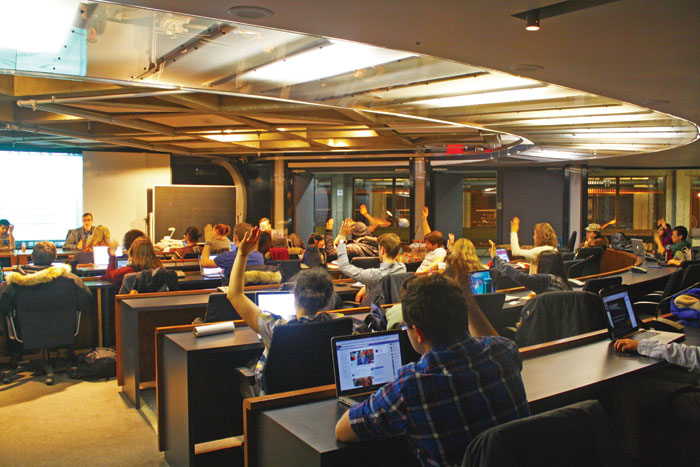SUS Budget
Last Wednesday, the Science Undergraduate Society (SUS) held its General Council (GC), during which the Winter 2015 budget was approved. The budget vote had been delayed from a previous meeting to incorporate funds from the Student Space Improvement Fee, which was approved in the recent referendum.
SUS Vice-President Finance Eileen Bui explained that the budget had incurred a $10,000 surplus.
“Usually, I do my budget very conservatively so we have left over money in case something happens,” Bui said. “In the past years, that’s how it’s always been […] it’s usually around that amount.”
Motion to formalize booking practices
The SUS also unanimously passed a motion in support of the Educational Community Living Environment (ECOLE), a sustainable living initiative that currently operates out of a former McGill residence house on University St. ECOLE also provides spaces that can be booked for student activities.
Students’ Society of McGill University (SSMU) Representative for SUS Zacheriah Houston moved a motion to formalize SUS’s current room booking privileges with ECOLE.
“This motion […] would grant ECOLE room booking privileges under the SUS, sort of similar to an independent student group under SSMU,” he said. “ECOLE already gives us room booking privileges and they do book rooms with some of the student societies on campus, but I just wanted to formalize that ability of [theirs] to book rooms.”
The motion also included a clause to recognize space provided by ECOLE and to promote the organization through the listserv. ECOLE representatives were optimistic about the support offered by SUS.
“We’re booked just about every day, sometimes twice a day during the week,” said SUS Vice-President External Affairs Emily Boytinck, who is also a member of ECOLE and represented the organization at the meeting. “It’s a great new student space. We have programming, we also have skill sharing workshops, film screenings. About 100 to 200 people walk through the space every week. It’s a very exciting project to be a part of.”
Online voting for elections
Saurin Shah, a representative from the McGill Science Computer Taskforce (CTF), gave a presentation on a new online voting system for SUS elections.
“It’s very simple to use and really has very little involvement from CTF input, which really streamlined the electoral process,” Shah said of the new system. “I know last year we handled six department elections and some of them had a little more issues than others, so we should probably negate that.”
According to the SUS executive team, they are hopeful that the new system will encourage departments to switch to online electoral systems and facilitate more efficient elections.
“Our CRO [Chief Returning Officer] used it for the [recent] referendum, and it was very easy to use,” SUS Vice-President Communications May Yin-Lao said.
The CTF also clarified their electoral agreement with the SUS, which will make the system of administering online elections easier to manage, while also freeing up server space for future collaborations with the SUS.









